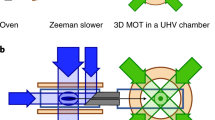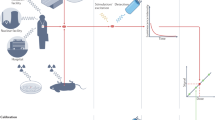Abstract
THE question as to whether normal gases become luminous when heated is of the greatest importance to those interested in the physics and chemistry of flame gases. Pringsheim did a great deal of work with the view of deciding this, and found that they remained dark at the highest temperature he could command in the laboratory1. In recent books by Lewis and von Elbe2 and Gaydon3, however, doubt is expressed whether at temperatures of the order of 2,000° C. they would still remain dark.
This is a preview of subscription content, access via your institution
Access options
Subscribe to this journal
Receive 51 print issues and online access
$199.00 per year
only $3.90 per issue
Buy this article
- Purchase on Springer Link
- Instant access to full article PDF
Prices may be subject to local taxes which are calculated during checkout
Similar content being viewed by others
References
Wood, R. W., "Physical Optics" (Macmillan, 1905), p. 457.
"Combustion Flames and Explosions of Gases" (Cambridge University Press, 1938).
"Spectroscopy and Combustion Theory" (Chapman and Hall, 1942).
Bone and Townend, "Flame and Combustion in Gases" (Longmans, Green and Co., Ltd., 1927), p. 326.
David, Engineer, 171, 268 (1941).
Author information
Authors and Affiliations
Rights and permissions
About this article
Cite this article
DAVID, W. Luminous Radiation from Hot Gases. Nature 150, 291–292 (1942). https://doi.org/10.1038/150291b0
Issue Date:
DOI: https://doi.org/10.1038/150291b0
Comments
By submitting a comment you agree to abide by our Terms and Community Guidelines. If you find something abusive or that does not comply with our terms or guidelines please flag it as inappropriate.



